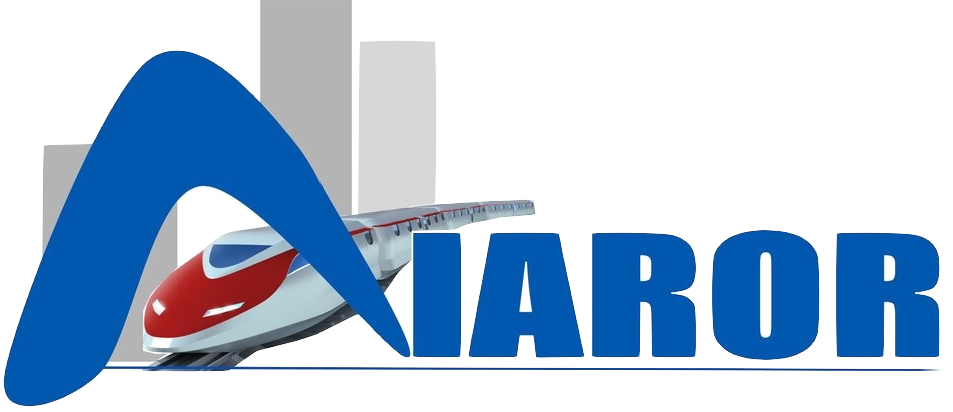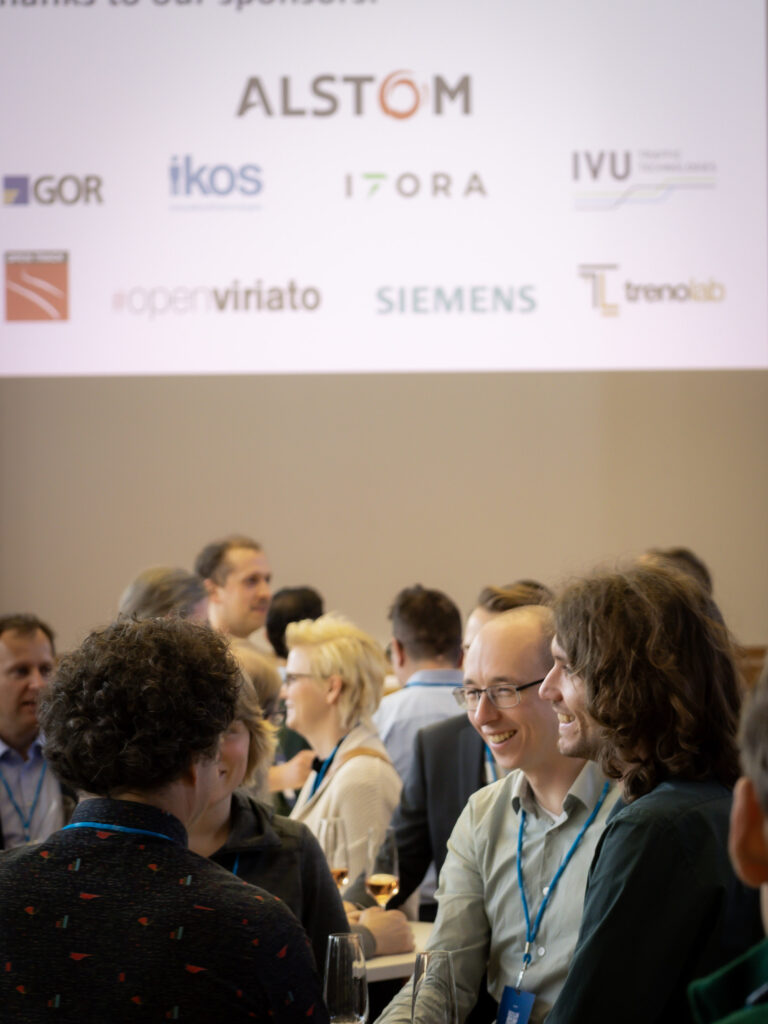
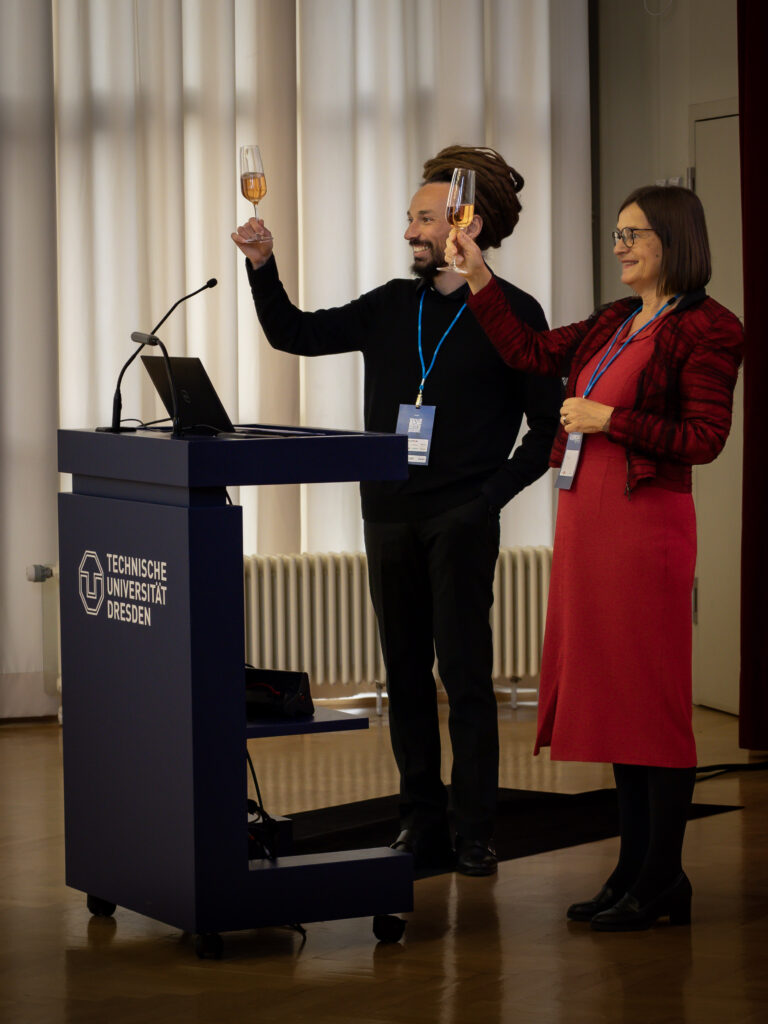
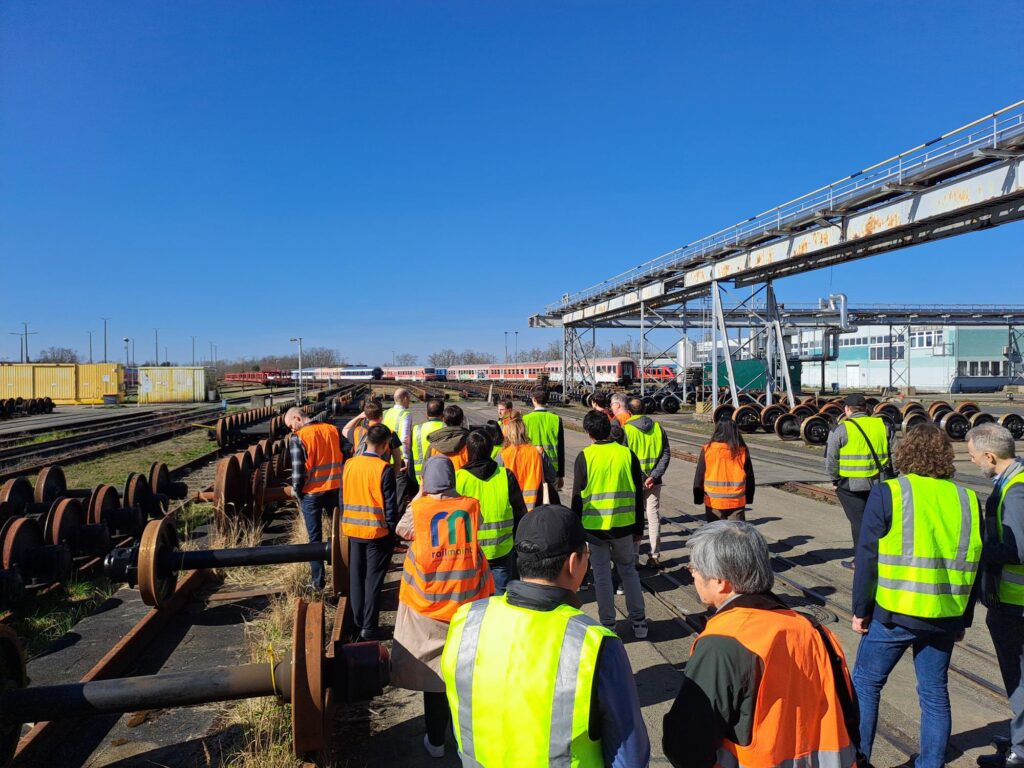



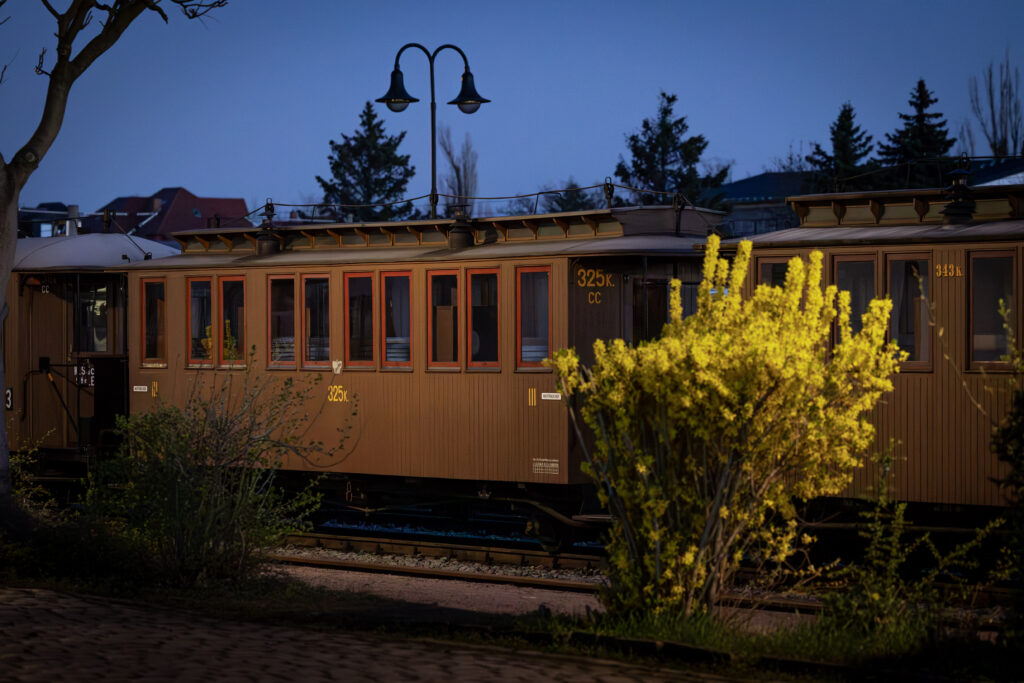



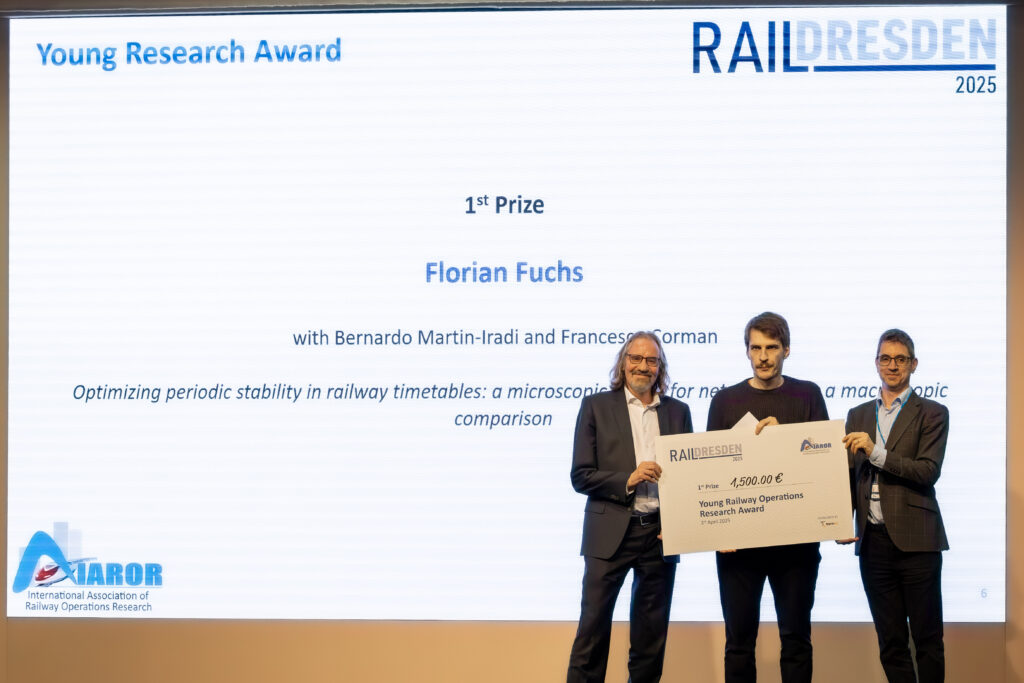
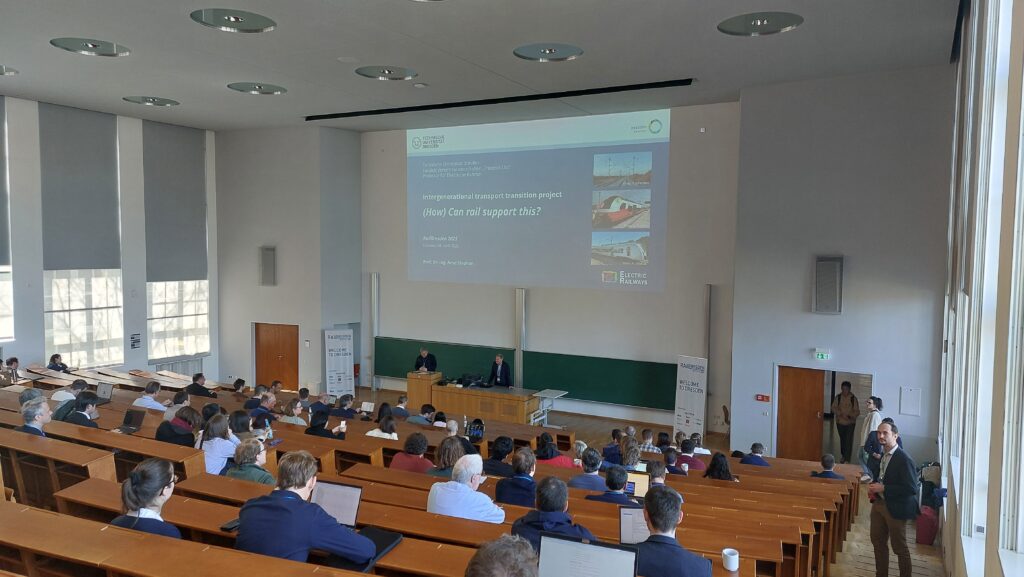

The 11th International Conference on Railway Operations Modelling and Analysis (RailDresden 2025) was hosted by the “Friedrich List” Faculty of Transport and Traffic Sciences, TU Dresden, in Dresden, Germany, on April 1-4, 2025.
RailDresden 2025 was co-organized by IAROR and the “Friedrich List” Faculty of Transport and Traffic Sciences at TU Dresden. The Organizing Committee consisted of
- Nikola Bešinović, TU Dresden (Conference Chair)
- Jörn Schönberger, TU Dresden (Conference Program Chair)
- Rob Goverde, Delft University of Technology (President of IAROR)
- Francesco Corman, ETH Zürich (Vice-President of IAROR)
The Organizing Committee was supported by a Scientific Advisory Committee (SAC) consisting of 60 IAROR Board members and additional IAROR members. Furthermore, the submitted papers were reviewed by a group of 137 reviewers, including the SAC and additional 77 reviewers. Thanks to all these volunteers, who made RailDresden 2025 a success!
The conference was well-received with 367 conference participants from 29 countries. Overall, 109 research papers and 26 industrial papers were presented in 6 parallel sessions of 4 streams. Moreover, we introduced poster submissions resulting in additional 98 poster presentations in 3 parallel sessions of 2 streams. The pre-conference mini-course was well attended by 96 participants.
RailDresden 2025 lasted 3 days plus a pre-conference mini course. The program included
- 3 keynote speeches by
- Prof. Dr. Anita Schöbel (RPTU University of Kaiserslautern-Landau) on Sustainable passenger rail transportation
- Prof. Dr. Xuesong Zhou (Arizona State University) on Foundations and Frontiers in Urban Rail and Freight Rail: Theoretical Advances, AI Innovations, and Future Directions for Multi-Modal Integration
- Prof. Dr. Arnd Stephan (TU Dresden) on Intergenerational transport transition project: Can rail support this?
- 135 presentations in 6 parallel sessions of 4 streams
- 97 posters in 3 parallel poster sessions of 2 streams
- Conference dinner at the Historischer Güterboden in Radebeul.
On Thursday afternoon 6 excursions were organized to DB InfraGO operation centre in Leipzig, DB InfraGO Dresden-Prague New Railway Line in Heidenau, the CargoBeamer test terminal in Leipzig, the RailMaint maintenance site in Leipzig, the TU Dresden Railway Operations and Railway Signalling Laboratories, and the Alstom Transportation production site in Bautzen.
The pre-conference mini-course contained four topics:
- Dr. Nenad Mijatovic (Alstom) on Building Trust in AI: Alstom’s Journey Towards New, Safe, and Reliable Mobility Solutions
- Dr. Pengling Wang (Tongji University) on Energy efficient train operation
- Dr. Debabrata Panja (Utrecht University) on Spatio-temporal networks for mapping railway operations
- Prof. Dr. Lingyun Meng and Dr. Zhengwen Liao (Beijing Jiaotong University) on Challenges and solutions of solving a large-scale networked high-speed railway disruption management problem.
The Young Railway Operations Research Awards were awarded to
- 1st Prize: Florian Fuchs (with co-authors Bernardo Martin-Iradi and Francesco Corman) for his paper “Optimizing periodic stability in railway timetables: a microscopic model for networks with a macroscopic comparison”
- 2nd Prize: Tamme Emunds (with co-author Nils Nießen) for his paper “A queueing-based approach for timetable-independent railway station performance analysis”
- 3rd prize: Ranfei Zheng (with co-authors Lingyun Meng, Xiaojie Luan, Jianrui Miao, Zhengwen Liao, Valentina Cacchiani and Feng Ran) for his paper “Resource-based integrated train rescheduling and rolling stock circulation replanning under different rolling stock usage rules”
The Best Papers of RailDresden 2025 were selected as
- Pengling Wang, Yutao Ye, Nils Nießen. Determine line plan and fare pricing strategies for newly constructed lines with dynamic interactions of passenger demand with travel time and ticket costs
- Florian Fuchs, Bernardo Martin-Iradi, Francesco Corman. Optimizing periodic stability in railway timetables: a microscopic model for networks with a macroscopic comparison
- Tamme Emunds, Nils Nießen. A queueing-based approach for timetable-independent railway station performance analysis
- Marta Leonina Tessitore, Marcella Samà, Giorgio Sartor, Carlo Mannino, Dario Pacciarelli. A fragility-based approach to timetable design
- Ranfei Zheng, Lingyun Meng, Xiaojie Luan, Jianrui Miao, Zhengwen Liao, Valentina Cacchiani, Feng Ran. Resource-based integrated train rescheduling and rolling stock circulation replanning under different rolling stock usage rules
- Renate van der Knaap, Niels van Oort, Rob Goverde. Multi-period railway timetabling to serve time-dependent demand
- Yahan Lu, Rob Goverde, Gábor Maróti, Dennis Huisman. An iterative heuristic for strategic timetabling with integrated passenger routing in railway networks
- Marko Kapetanović, Nikola Bešinović, Alfredo Núñez, Niels van Oort, Rob Goverde. An intermittent partial electrification network design problem for the introduction of battery-electric regional trains
- Peiran Han, Lingyun Meng, Xiaojie Luan, Jianrui Miao, Zhengwen Liao, Nikola Bešinović. A reward-driven 0-1 integer programming for optimizing railroad flat yard switching: A sequential decision approach
- Natchaya Tortainchai, Taku Fujiyama. Train dwell time models for high-passenger-volume stations using a bivariate distribution function.
The authors of the Best Papers were invited to submit their paper to the Special Issue on the Best Papers of RailDresden 2025 in the Journal of Rail Transport Planning & Management (JRTPM).
Scientific Advisory Committee (SAC) of RailDresden2025
- Abhyuday (Indian Railways)
- Ivan Belosevic (University of Belgrade)
- Nikola Besinovic (TU Dresden)
- Markus Bohlin (Mälardalen University)
- Francesco Corman (Swiss Federal Institute of Technology, ETH Zurich)
- Tyler Dick (University of Texas at Austin)
- Rob Goverde (Delft University of Technology)
- Ingo Hansen (Delft University of Technology)
- Steven Harrod (Technical University of Denmark)
- Nadia Huerlimann (OpenTrack Railway Technology)
- Yung-Cheng (Rex) Lai (National Taiwan University)
- Alex Landex (Ramboll Group)
- Christian Liebchen (Technische Hochschule Wildau)
- Carlo Mannino (SINTEF)
- Giorgio Medeossi (TRENOlab)
- Lingyun Meng (Beijing Jiaotong University)
- Lei Nie (Beijing Jiaotong University)
- Nils Niessen (RWTH Aachen)
- Andreas Oetting (Technische Universität Darmstadt)
- Dario Pacciarelli (University Roma Tre)
- Paola Pellegrini (Université Gustave Eiffel)
- Anders Peterson (Linköping University)
- John Preston (University of Southampton)
- Stefano Ricci (University of Rome “La Sapienza”)
- Joaquin Rodriguez (Université Gustave Eiffel)
- Thomas Schlechte (LBW Optimization)
- Norio Tomii (Nihon University)
- Pieter Vansteenwegen (University of Leuven)
- Alex Wardrop (TTG Transportation Technology)
- Chao Wen (Canadian National Railway)
- Thomas White (Transit Safety Management)
- Andrea D’Ariano (University of Roma Tre)
- Tristan Becker (TU Dresden)
- Udo Buscher (TU Dresden)
- Stéphane Dauzère-Pérès (Ecole des Mines Saint-Étienne)
- Valerio de Martinis (ZHAW)
- Jan Ehmke (Uni Vienna)
- Jan Eisold (TU Dresden)
- Tabish Haque (TU Dresden)
- Johann Hartleb (DB InfraGO)
- Vera Hemmelmayr (WU Vienna)
- Natalia Kliewer (TU Berlin)
- Bing Liu (TU Dresden)
- Matthias Müller-Hannemann (University Halle-Wittenberg)
- Jörn Pachl (Technical University of Braunschweig)
- Saeid Saidi (Calgary)
- Jörn Oliver Schönberger (TU Dresden)
- Niels Lindner (ZIB Berlin)
- Roman Lisner (Deutsche Bahn)
- Zhenliang Ma (KTH)
- Jannis Neufeld (OVGU Magdeburg)
- Henning Preis (TU Dresden)
- Johannes Schlaich (BHT Berlin)
- Andreas Sohlke (Deutsche Bahn)
- Irene Sturm (Deutsche Bahn)
- Christopher Szymula (TU Dresden)
- Christian Truden (Austria)
- Pengling Wang (Tongji)
- Yihui Wang (BJTU)
- Norman Weik (TU Munich)
